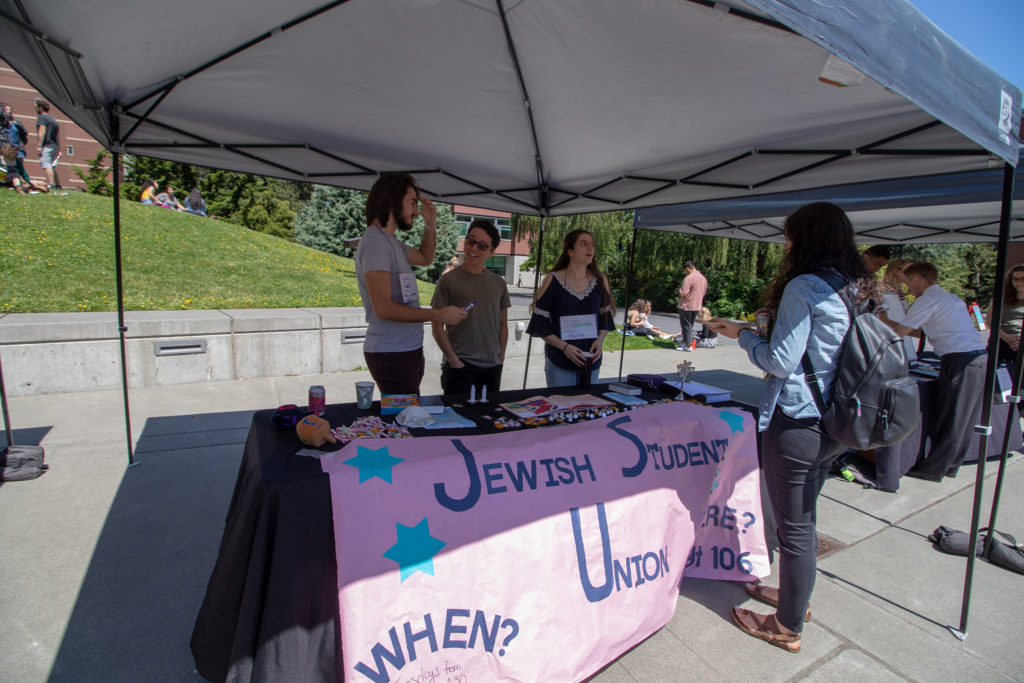Under a warm afternoon sun, Seattle University’s Campus Ministry held the first Interfaith Fair. On May 23, students and staff from most religious groups on campus attended the fair, answering questions and creating a dialogue.
Attendees were served aromatic dishes and offered an assortment of ice creams. Chart-topping pop songs kept a quick tempo, and cheerful conversation accompanied the lively tunes. Although sparsely attended at first, the event soon drew people’s attention and became an animated gathering.
Emily Pacunski, a third-year criminal justice and social work major, was at the fair as a member of the Intervarsity Christian Fellowship.
“I think it’s good to have an interfaith fair because not everybody here is obviously Catholic, and so having the opportunity to interact with people of different faiths and learn more about that is really important,” she said.

The Jewish Student Union met with many interested participants and had involved conversations with them about their beliefs.
Pacunski’s emphasis on the interaction between people of different faiths is the heart of the Interfaith Fair.
Pacunski and Emily Litterer, a campus minister with Intervarsity Christian Fellowship, brought a modern translation of the Bible to the fair. It sat front-and-center on the table at their stall. Litterer explained that this version of the Bible uses gender-inclusive language and doesn’t identify God with gendered pronouns.
As time went on, the fair began to buzz with activity. Students flocked to the colorfully decorated stalls, and the representatives spoke quickly to describe their different organizations. A group of students danced between the stalls to the infectious music.
Emily Gough, a fourth-year biology major and treasurer for the Latter-Day Saints Student Association at Seattle U, spoke about the importance of bringing diverse religious traditions to the Interfaith Fair.
“I’m doing the interfaith immersion because I think it’s really important for everyone to learn about diverse religions and come to the understanding that we’re really not that different,” Gough said.
The belief that people from varying religious backgrounds are really not that different was echoed by the rest of the representatives and many of the students at the Interfaith Fair.
“It just feels like a beautiful day to talk to people and just connect and be human.”
Gough was accompanied by Elder Fisi’iahi and Elder Jarvis, two representatives from the Church of Jesus Christ of Latter-Day Saints. They spoke briefly about their church and its teachings, but soon moved on to talk about where they’d grown up and what their hobbies were.
While comprehensively prepared to discuss their religious organizations, the representatives at the Interfaith Fair were happy to speak about their non-religious pursuits.
Kauser Gwaduri, a first-year graduate student in the student development administration program, helped plan the event with Campus Ministry.
“We went to an interfaith conference. We’re a Jesuit university and we wanted to talk about faith and how that relates to who we are,” Gwaduri said. “It just feels like a beautiful day to talk to people and just connect and be human.”
Gwaduri, an agnostic Muslim, was visibly delighted by the success of the event she’d worked tirelessly to create.
Amina Ibrahim, a fourth- year communication and media studies major, spoke about the importance of the Interfaith Fair at a Catholic university.
“I think it’s really important for people to learn about religions that aren’t really talked about as often,” said Ibrahim.
Ibrahim’s understanding of the importance of the Interfaith Fair concisely identifies the reason why Seattle U needs events such as these.
As the fair carried on, its atmosphere turned from lively to relaxed. Students and representatives held lengthy, thoughtful conversations, and the warm air glowed. Tension melted away from the faces of those who had planned the event.
Victoria Carr-Ware, an ecumenical and multi-faith campus minister, smiled warmly as she spoke of the importance of the event she’d planned and carried out.
“It’s hard to hate people when you know them,” Carr-Ware said.
Carr-Ware summed up the power of the Interfaith Fair to combat hatred through education and introduction to people of different faiths.
Attendees of the Interfaith Fair were in agreement that the event created a dialogue about religion and diversity on the Seattle U campus. People were given the opportunity to ask and answer questions in a judgement-free environment.
The question that led to the creation of the fair, according to Carr-Ware, intended to build this environment.
“Wouldn’t it be good if we had a fair where folks on campus can just be able to ask questions?”
The editor may be reached at
news@su-spectator.com








